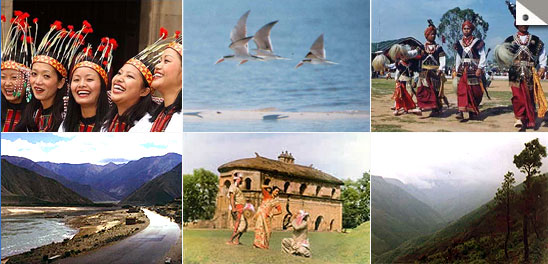N-E History To Be Included in Indian Universities Curriculum
North East India

DIMAPUR: In a latest development, the University Grants Commission (UGC) has advised Indian Universities to include history of the Northeast in the university curriculum.
This is very welcome move because anyway the history of the country would be incomplete without including the history of the Northeast, a region which has contributed much towards the making of modern India. Here, one ought not to forget the economic contributions this region made, even before the British Raj, in the form of tea production and the concomitant spill-over effects on other economic growth cannot be over-emphasized.
In fact, the economic history of this region clearly indicates that the British Raj has impoverished the Northeast just so to benefit the Raj and not the people of this region.
However, to include the Northeast in university curriculum would not be an easy task and a smooth exercise because here even within the states and the communities therein, there are disagreements and differences about our history, starting from the migratory past. In fact, it is these very disagreements and differences, especially in regards to our history that have led to the creation of the numerous conflicts in the region.
Moreover, it would not do to teach political history of the region alone in the Northeast ~ in fact, without economic and social history, as well as the anthropological and sociological histories, the “history” of the Northeast would be incomplete too. Now, because studies and research in the numerous disciplines are still on-going, it would be difficult to say: “Here, this is the history of the Northeast”.
Besides, because numerous communities also have varied and various perceptions of history, it is a matter of debate whether what academicians and experts in the various disciplines would be acceptable to these communities.
Further,what may be acceptable would depend on the current power structures and systems that may not be in consonance with scientific studies and research. This would be a very difficult task for all kinds of historians.
It is acceptable that the Union Minister of Human Resource Development has reportedly said that the course material may include novels and short stories from the Northeast, history of Northeast including personalities who participated in anti-colonial uprisings and freedom movement. But here again, there are diverse views on which novels and short stories “correctly” portray the region.
An Assamese perspective would be very different from say a Naga or Tripuri’s. And let’s not forget that there is a controversy about some personalities, for instance Rani Guidinlui.
Thus,the question would be who history would find acceptance to be introduced in university curriculum? There is also the problem of clubbing all Northeast histories as one narrative, which is difficult for this region’s communities to swallow because most communities here have been “sovereign” in their own rights, give and take a few conquests here and there over the centuries, which again cannot be perceived from the prism of modern constructs.
Perhaps, one of the major factors contributing towards the various types of conflicts in the Northeast is that our communities, our histories, our customs and traditions, which are more or less still left untouched, are viewed through the prism of modern constructs, while communities feel that they are indigenous and immutable, which indubitably are used and misused by power centres through the decades after the introduction of modern education ~ but that is altogether another chapter all by itself.
And because the more “modern” we become the more sensitive and the more intolerant we become, those who are entrusted with writing the history of the Northeast for university curriculum do have an unenviable job.
It is rather time to embark on this very difficult task for sooner or later, because not only university students across the country today but even Northeastern youngsters must be introduced to our history, however imperfect the accounts may be at this juncture. The onus would then be on our youngsters to study and research and keep on updating with historical accounts that would reach nearer to facts.
Wouldst to God that by that time, we would be mature enough to look at ourselves honestly, warts and all.



